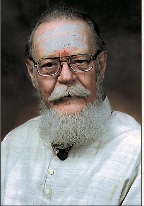By Devananda Tandavan
Thirty percent of the American public suffers from it at least once a month and 10 percent suffer daily. Heartburn is a burning pain in the substernal (upper-torso) area or in the back at heart-level between the shoulders. The pain may be localized, but may also extend up to the throat.
The usual cause is dietary indiscretion: overeating, overdrinking, too much coffee, alcohol or very spicy food. When one overeats or partakes of the wrong foods, there is a tendency for stomach contents to regurgitate into the lower end of the esophagus. This is especially true when one lies down to sleep. Pain results when the stomach acid irritates and burns the delicate mucosa lining of the esophagus. The cause of heartburn is malfunction of the valve at the lower end of the esophagus. It is most common in the older population. This simple form of heartburn can be readily treated with antacids (Maalox, Gaviscon, etc.) or H2-blockers (Tagamet, Axid, Pepcide, etc.)
A recent study found that conventional antacids gave quick relief usually lasting two hours. The H2-blockers often took two hours just to have any effect–a good case for not spending extra money on such high-tech drugs. Manufacturers advertise that one should take medication before anticipated dietary indiscretions, which is really showing a seller’s bias. If the heartburn is only intermittent or occasional, antacids and H2-blockers can relieve the symptoms. But if it becomes a daily symptom, the condition should be looked into for more serious problems.
Chronic heartburn is usually caused by a loose esophageal gastric junction (at the entry to the stomach) so that reflux (reentry of stomach fluids to the esophagus) is frequent. There are also times when herniation pushes the stomach into the lower thorax, allowing ready pouring of the stomach contents into the esophagus. Both conditions may require a simple surgical operation. Chronic heartburn must be diagnosed and treated. On very rare occasions it may be a symptom for heart disease and even cancer.
Daily use of antacids may be harmful, due to their content of magnesium or aluminum. These metals cause problems when their level in the blood gets too high. Antacids containing calcium can disrupt the sensitive balance of the body’s minerals, leading to bone and joint problems. As safe as the H2-blockers seem to be, excessive dosage can lead to a dangerously low level of gastric acid–inadequate for proper digestion or absorption of vitamin B12 and possibly causing pernicious anemia.
Dietary changes can reduce heartburn. Start by eliminating offending foods, such as caffeine, chocolate, tomatoes, citrus juices and fried, fatty or spicy foods. Have the largest meal at midday and limit the size of meals so that the stomach is not overdistended. Do not bend or squat after eating. Perhaps elevating the head of the bed will help. Eliminating aspirin and alcohol is desirable. Smoking should be discontinued. It has been shown that smoking only two cigarettes over twenty minutes reduces the strength of the esophageal valve by fifty percent and increases the stomach’s acidity. The simple Vedic diet, even though spicy, is ideal, and will usually not allow this symptom to occur.
Dr. Tandavan, 77, retired nuclear physician and hospital staff president, lives in Chicago, where he specializes in alternative healing arts. Visit his home page at the Hinduism Today Website.
